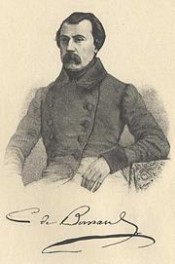Bernard Charles de

Pierre-Marie-Charles de Bernard du Grail de la Villette (February 24, 1804 – March 6, 1850), better known simply as Charles de Bernard, was a French writer. He was born in Besançon, member of a very ancient family of the Vivarais, was educated at the college of his native city, and studied for the law in Dijon and at Paris. He was awarded a prize by the Académie des Jeux Floraux for his Une fête de Neron in 1829. This first success in literature did not prevent him aspiring to the Magistrature, when the July Revolution broke out and induced him to enter politics. He became one of the founders of the Gazette de Franche-Comte and an article in the pages of that journal about La peau de chagrin earned him the thanks and the friendship of Honoré de Balzac. The latter induced him to take up his domicile in Paris and introduced him to the art of novel-writing. Bernard had published a volume of odes: 'Plus Deuil que Joie' (1838), which was not much noticed, but a series of stories in the same year gained him the reputation of a genial 'conteur'. They were collected under the title 'Le Noeud Gordien', and one of the tales, 'Une Aventure du Magistrat,' was adapted by Victorien Sardou for his comedy 'Pommes du voisin'. 'Gerfaut', generally acclaimed as his greatest work, crowned by the Academy, appeared also in 1838, then followed 'Le Paravent', another collection of short stories (1839); 'Les Ailes d'Icare' (1840); La Peau du Lion and La Chasse aux Amants (1841); L'Ecueil (1842); Un Beau-père (1845); and 'Le Gentilhomme campagnard,' in 1847. Bernard wrote two comedies in collaboration with "Léonce" (Charles-Henri-Ladislas Laurençot, 1805-1862). A collection of Bernard's complete works in 12 volumes was published after his death. His writings have been mostly forgotten today. Jules Arsène Arnaud Claretie wrote about Bernard with much praise: In The Paris Sketch Book [1] William Makepeace Thackeray discusses Bernard's writing: Henry James, in his French Poets and Novelists (1878), wrote: This article includes material from the preface (by Jules Claretie) to an English translation of Gerfaut
do you like this author?
What readers are saying
What do you think? Write your own comment on this book!
write a commentWhat readers are saying
What do you think? Write your own comment on this author!
write a commentWhat readers are saying
What do you think? Write your own comment on this author!
write a commentif you like Bernard Charles de try:
readers also enjoyed
What readers are saying
What do you think? Write your own comment on this author!
write a commentGenre
if you like Bernard Charles de try:
readers also enjoyed
Do you want to read a book that interests you? It’s EASY!
Create an account and send a request for reading to other users on the Webpage of the book!


